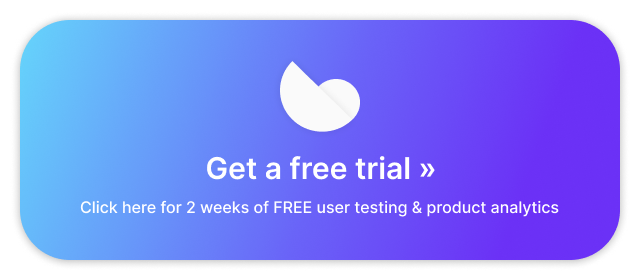If you haven’t already heard, Trymata’s co-founders launched a brand new UX & product focused podcast, titled “Re:Design/Growth,” in March of this year. Just 6 episodes in, we’ve already learned a lot from our guests about product strategy, UX research, innovation, and much much more.
The fundamental goal of the Re:Design/Growth podcast is to explore the relationship between product and growth in a business. Every episode, we invite smart and experienced product professionals (so far including CEOs, CPOs, and Senior UX Researchers) to join us in a live, unplanned and unstructured conversation.
As each conversation naturally unfolds, we hear their perspective on a variety of product-related topics, and learn about some of the lessons they’ve picked up in their careers.
Some topics crop up frequently – already, we’ve heard multiple different guests’ thoughts on things like the role of AI in the future of the User Experience space, or on the old tech mantra of “Move fast and break things.” Each episode usually also has its own unique topics and ideas that are addressed, based on the background and experience of the guest.
Our favorite quotes from the first 6 episodes of Re:Design/Growth
Below, we’ve compiled some of the most impactful quotes about UX & product from our first 6 episodes. These quotes offer wisdom on product decision-making, talking to users, maximizing the impact of UX work, planning the right roadmap, and more.
We hope you find insight and inspiration from them – and that you’ll listen along with future episodes!
1. Adding value as a UXer
Find a way to insert the things about behavior that allow you to have insight, that allow you to contribute something that no one was looking for or expecting.
– Rob Aseron
Rob Aseron, a UX researcher with 25+ years of experience, spoke to us about how UX professionals can add the most value in their organization. According to him, it all comes down to understanding human behavior.
These days, he pointed out, many people throughout an organization are collecting and looking at data about users – but a UXer should be able to bring a unique perspective on how people behave, especially in the context of digital products. In this way, you can contribute something unique that nobody else is doing.
2. Accepting negative user feedback
I try to immediately, with all customers, set a really clear expectation that any feedback they give me – any negative feedback – is a huge gift.
– Amélie-Sophie Vavrovsky
Amélie Vavrovsky, founder and CEO of legal-tech startup Formally, talks to her users all the time. One of the most important things you can do when talking to users, she shared, is to make sure you’re getting their raw, honest opinions – especially if those opinions are critical.
The negative feedback, Amelie added, is where she and her team learn the most. So she communicates that with her users, and they “gift” her with actionable insights about how to make the product better.
Read more: Trymata client Nat Geo on accepting negative feedback
3. The importance of UX research
When you first get a product in front of a user, you are going to recognize all of these mistakes you made in the design process. And you’re going to recognize significantly more mistakes in the early days […] than you are in later days, after you’ve already iterated on those problems that have come up.
– Bailey Farren
Bailey Farren, the founder and CEO of Perimeter, also talks to users a lot. As the head of an early-stage startup, she feels that those sessions are especially valuable so early on. “The conversations that we have now,” Bailey continued, “are going to have huge implications as to the way that User #5,000 actually uses the platform, and how easy it is for them.”
Of course, between now and then, they’ll be constantly iterating, bringing the product closer and closer to where it needs to be.
4. Taking risks in product development
If you’ve got the right framework, you’ve got a really really good agile team, and you’ve got a hypothesis […] don’t be afraid of moving fast and breaking things.
– Darby Sieben
Darby Sieben is the Chief Product Officer at Unbounce. During his appearance on Re:Design/Growth, we asked him about his perspective on failure in a product context. Darby’s take was that failure is a guarantee some of the time – but as long as your fundamentals and product processes are sound, you shouldn’t be afraid to take some risks.
He did add on, though, that “you have to be a little bit careful sometimes, protecting your core revenue.” Coincidentally, this echoed a piece of wisdom that Dan Fleetwood had offered in his episode the week prior, advocating for a mantra of “Move fast with stable infrastructure.”
5. Creating magical user experiences
We try to be super disciplined about what do we actually need to build that will provide a magical user experience, and how do we find those magic moments?
– Amélie-Sophie Vavrovksy
One thing Amélie focused on during Episode 5 of Re:Design/Growth was having discipline about the product roadmap, and learning what to build and what not to build.
How does she make that decision? For her, it’s all about creating “magic moments” for the user. If a new feature can solve a problem for customers that transforms the way they work for the better, that’s a feature worth building.
Read more: Creating moments that delight users
6. Proving the value of UX internally
If we from UX research can’t show that we can reliably measure UX phenomena, can’t show that those are valid measures, can’t show how those things integrate into the way the organization looks at data – then we should expect, come decision time, not to be involved.
– Rob Aseron
We can never assume that every stakeholder and decision-maker will understand or appreciate the value of UX. But we can advocate for it, and as Rob shared during Episode 2, a good way to do that is to ensure that is through reliable, relevant UX metrics.
More than ever, the most successful businesses today are the ones making data-driven decisions. UX should be a part of that picture, Rob argues, and that means that measurable data should be part of UX’s contributions in an organization. This way, we can ensure that UX has a seat at the table when critical decisions are being made.
Read more: Measuring user experience with Trymata’s UX Diagnostics
7. Underlying technology vs outcomes for users
Us within the tech space fall in love sometimes with the technology, as opposed to the outcome of what technology does or means.
– Darby Sieben
With the recent spotlight on ChatGPT and other AI engines, we got to talking with Darby about the future role of AI in product development.
He offered a welcome reminder that despite the excitement many in the tech industry feel about new and powerful technologies, the vast majority of people (i.e., end users) don’t actually care about the technology itself – what really matters is what can be done with it.
Continuing on, he stated: “I still think it fundamentally comes down to what problem are you solving, what are the use cases, and how do you almost take the technology and put it behind, and focus on the outcomes?”
8. Prioritization in product roles
You can get bogged down by the minutiae of things and really get into the weeds, but you really need to focus on areas of impact that can move the needle forward, as opposed to just doing the day-to-day kind of roles.
– Dan Fleetwood
In the product & UX space, it’s very easy to get deep in the weeds, and spend lots of time on the little details. And for what it’s worth, those little details are very important in product – but so are the big-picture tasks.
Dan Fleetwood, President of Research & Insights at QuestionPro, talked with us about balancing those 2 sides of product work, and emphasized the importance of maintaining focus on things that will have the greatest impact for the business.
9. The future of AI in UX research
I think there’s a big opportunity for UX research that’s not gonna be influenced by AI, but it’s gonna be that part of the scale of contribution in the organization that isn’t the everyday tasks right now. And so it’s going to become a more rewarding profession, because it’s going to be more about the really impactful, strategic, thoughtful tasks.
– Rob Aseron
Throughout a variety of industries, people are starting to worry about what AI will replace. Some in the User Experience field have wondered whether AI will eliminate entire job roles or functions.
On this topic, Rob was not so worried, and even tentatively optimistic: what could happen, he suggested, is that the more labor-intensive aspects of UX work will be automated, freeing up UX professionals’ time for more meaningful work that adds greater value. In that case, UX could become an even more exciting and gratifying field.
Coming up on the Re:Design/Growth podcast
We’re looking forward to many more engaging and inspiring episodes of the Re:Design/Growth podcast over the next weeks and months. Our co-founders (and co-hosts) will be continuing to chat with product professionals and thought leaders every week, and sharing what we learn with you.
Each episode is livestreamed via Trymata’s official Linkedin account on Fridays at 11am Pacific / 2pm Eastern (US time). We hope you’ll connect with us on Linkedin to stay in the loop about upcoming episodes and see recaps and clips!
To get more of the Re:Design/Growth podcast:





